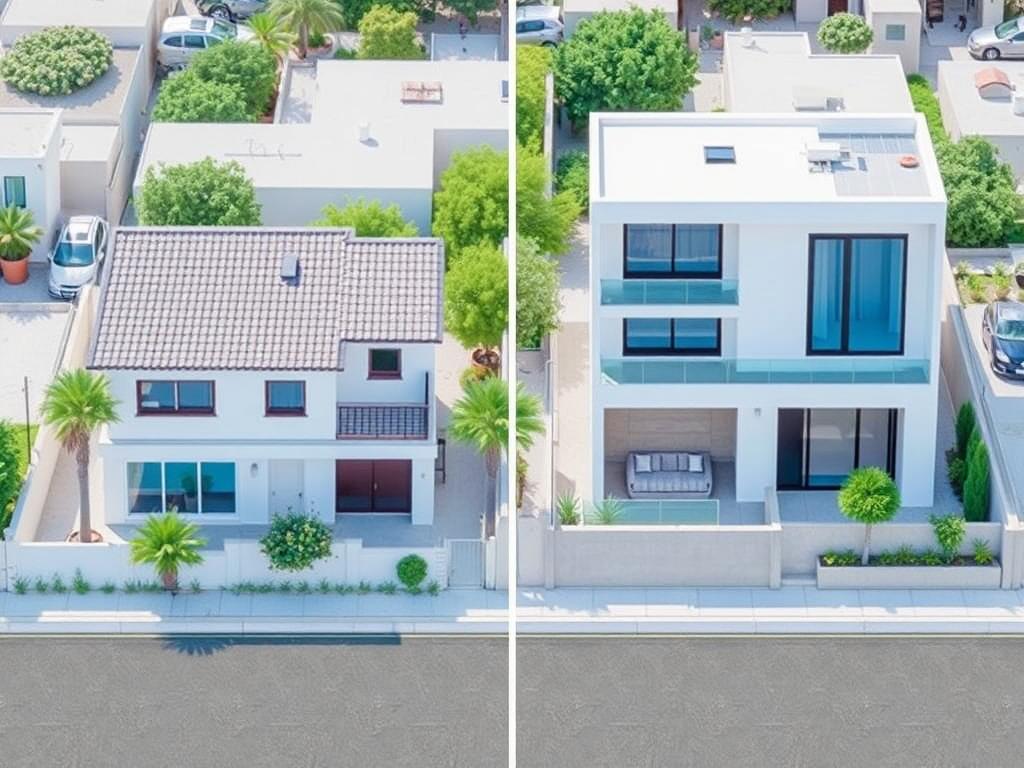Cyprus has emerged as one of the most attractive real estate markets in the Mediterranean, drawing investors from around the world with its unique blend of economic stability, strategic geographic location, and appealing lifestyle factors. This island country offers diverse property investment opportunities, primarily divided into residential and commercial segments. Understanding the nuances between residential vs commercial property Cyprus investment prospects can be the difference between a successful portfolio and a missed opportunity. This analysis explores the key distinctions, benefits, and challenges of investing in residential and commercial real estate, providing a comprehensive property investment comparison Cyprus investors need before committing capital.
Overview of Cyprus Property Sectors
The Cyprus property sectors are broadly allocated into residential and commercial real estate, each catering to different market demands and investment profiles. Residential real estate in Cyprus primarily includes properties intended for private accommodation such as apartments, villas, and houses. It benefits from robust local demand driven by both Cypriots and expatriates looking for holiday homes or permanent residences. Meanwhile, commercial real estate encompasses retail spaces, offices, industrial buildings, hotels, and mixed-use developments, attracting businesses and investors focused on rental income and capital appreciation linked to economic activities.
The economic recovery in Cyprus following the 2013 financial crisis has significantly impacted property sectors. Catalyzed by improving economic conditions and a surge in tourism, commercial real estate has seen renewed interest, especially in office space and hospitality. In contrast, residential properties continue to benefit from domestic demand and foreign buyers drawn by residency incentives associated with property purchases.
The distinct drivers behind residential and commercial property sectors in Cyprus influence their risk, return, and liquidity profiles, shaping investor choices.
Market Dynamics and Demand Factors
Understanding the market dynamics in residential vs commercial property Cyprus investments starts with demand determinants. Residential demand is primarily fueled by personal needs, demographic trends, and lifestyle preferences. Cyprus boasts a growing expatriate community, particularly retirees from Europe, and a steady influx of professionals attracted by emerging business hubs. The government’s policies supporting residency and citizenship through property purchases add to residential appeal.
On the other hand, commercial real estate demand in Cyprus hinges on the strength of the business environment, tourism levels, and broader economic indicators. Retail and office spaces accommodate expanding service sectors, technology firms, and financial institutions. Meanwhile, the hospitality sector’s growth, driven by year-round tourism, supports investments in hotels and leisure facilities.
Seasonality affects both sectors but varies distinctly. Residential markets tend to exhibit steadier demand year-round, while commercial properties linked to tourism face peak and off-peak cycles, influencing rental yields and occupancy rates.
Rental Demand in Residential vs Commercial Property
Rental demand is a critical factor shaping investment returns residential vs commercial Cyprus. Residential rental yields are generally stable, especially in popular urban centers like Nicosia, Limassol, and Larnaca, or resort areas such as Paphos and Ayia Napa. These markets attract expatriates, students, and local tenants, ensuring a diversified rental base.
Conversely, commercial rental demand depends largely on business cycles and tenant creditworthiness. Long-term leases with reputable tenants in office and retail spaces offer security but can be vulnerable during economic downturns. Industrial properties, while less common, target logistics growth.
Rental demand profiles between residential and commercial real estate distinctly affect income stability and investment risk in Cyprus.
Investment Returns: Residential vs Commercial Cyprus
A fundamental consideration for investors is the balance between risk and return. The investment returns residential vs commercial Cyprus present differ notably because of underlying supply and demand dynamics, tenant types, and lease structures.
Residential investments tend to generate moderate but steady rental yields, often ranging between 3% to 5% annually, with capital appreciation driven by population growth and lifestyle demand. The relatively low entry cost and ease of financing residential property also make it attractive to individual investors and smaller funds.
Commercial real estate investments offer the potential for higher returns, typically ranging from 6% to 10% in rental income, reflecting longer lease terms, inflation-linked rents, and added value through property management efficiencies. However, these come with increased risks, including tenant turnover, market cyclicality, and regulatory complexities. Prime office or retail spaces in city centers often command premium prices but also offer stable, long-term tenants.
The hospitality segment within commercial sectors can deliver high returns during peak tourism seasons but fluctuates significantly in off-peak periods or during global disruptions like pandemics.
| Investment Type | Typical Rental Yield (%) | Capital Appreciation Potential | Risk Profile | Liquidity |
|---|---|---|---|---|
| Residential Property | 3 – 5 | Moderate and Steady | Low to Medium | Higher |
| Commercial Property | 6 – 10 | High, Market-dependent | Medium to High | Lower |
Higher yields in commercial real estate come with increased market volatility and longer holding periods compared to residential investments.
Regulatory and Fiscal Environment
Property investment comparison Cyprus is incomplete without analyzing the regulatory and tax frameworks that impact residential and commercial real estate differently. Cyprus has developed investor-friendly policies over the years, yet nuances exist between these sectors.
Residential real estate buyers benefit from relatively straightforward purchase processes, residency permits linked to property ownership, and favorable property tax regimes. Stamp duty and transfer fees are moderate, and the VAT system generally exempts residential sales. Capital gains tax applies on sales within a set period but offers exemptions for primary residences.
Commercial property investors face more complex regulatory compliance, including stricter zoning laws, licensing requirements, and tax obligations. VAT is consistently applicable to commercial transactions, increasing acquisition costs. Furthermore, corporate structures often used for commercial investments attract separate accounting and tax reporting requirements.
For both sectors, the Cyprus government offers various incentives to stimulate real estate sectors, including tax breaks for rehabilitation projects and sustainable development grants, providing investors with additional avenues to improve net returns.
Financing and Investment Structure
Securing capital for property purchases in Cyprus involves differing approaches for residential and commercial assets. Residential financing is widely accessible through local banks offering mortgage loans with favorable interest rates and extended amortization periods. Foreign investors also benefit from competitive lending conditions, allowing higher loan-to-value ratios.
Commercial real estate financing is more selective and often involves higher down payments, stricter credit assessments, and shorter loan tenures. Institutional investors might leverage syndicated loans or capital raise through real estate investment trusts (REITs) or private equity for larger commercial projects.
Joint ventures and partnerships are common in commercial property investments due to the scale and complexity of developments, while residential properties often appeal to individual purchasers or small investor groups. Sound financial structuring can mitigate downside risks and optimize cash flow in both sectors.
Financing availability and terms vary significantly between residential and commercial properties, influencing investor accessibility and risk tolerance.
Location Factors: Urban vs Tourist Zones
Location remains a critical determinant in the property investment comparison Cyprus. Residential investments predominantly cluster in urban centers like Nicosia or coastal tourist hubs such as Paphos and Limassol. Urban residential properties benefit from proximity to employment, education, healthcare, and infrastructure, while tourist zones offer seasonal rental opportunities and lifestyle appeal.
Commercial real estate investments focus heavily on business districts, retail corridors, ports, and airports. Limassol, in particular, has developed into a commercial hotspot, hosting shipping companies and corporate headquarters. The burgeoning tech and services sectors influence demand for modern office spaces here.
Tourism-heavy areas influence both residential holiday home markets and hospitality commercial investments. Seasonal dynamics here can intensify rental income potential but increase vacancy risks off-season.
Risk and Volatility Considerations
Investors must weigh different risk profiles when deciding between commercial real estate vs housing Cyprus. Residential property tends to be less volatile, with steady demand due to fundamental human needs like housing. However, it is not immune to market downturns, regulatory shifts, or exposure to localized oversupply.
Commercial real estate carries higher volatility associated with economic cycles, tenant solvency, and market sentiment. Economic disruptions, such as the COVID-19 pandemic, revealed vulnerabilities in retail and office spaces, prompting reassessment of investment risks.
Investment horizon also affects risk tolerance; commercial property often requires a longer holding period to realize gains and absorb market fluctuations, while residential investments may offer quicker turnaround through sales or rental income.
Risk tolerance and investment goals must align with the distinct volatility profiles of residential and commercial property sectors in Cyprus.
Future Trends and Emerging Opportunities
Looking toward the future, Cyprus property sectors are evolving in response to technological, demographic, and sustainability trends. Digitization and the rise of remote working are reshaping commercial real estate, with hybrid office designs and co-working spaces gaining importance, offering new niches for commercial investors.
Residential investment is seeing growth in eco-friendly and smart home developments, reflecting changing buyer preferences. The Cyprus government’s sustainability agenda, including green building regulations, is likely to impact both sectors.
Infrastructure projects, improving connectivity, and increasing tourism diversification into niche segments (like medical and adventure tourism) open fresh avenues for both residential and commercial investors, underscoring the need for informed asset allocation strategies.
Deciding Between Residential and Commercial Property Investments in Cyprus
Choosing between residential versus commercial property investments in Cyprus ultimately depends on an individual investor’s objectives, risk appetite, capital availability, and market knowledge. Residential properties offer easier entry, stable cash flows, and appeal to those seeking lower-risk exposure with gradual capital growth. These traits make them ideal for personal use, retirement planning, or gradual portfolio building.
Commercial real estate suits investors looking for diversified income streams with potentially higher returns balanced by increased complexity and risk. It requires active management and a willingness to engage with market dynamics more intensely but can yield impressive rewards over time.
Prudent investors often consider blending residential and commercial assets to capitalize on the complementary strengths of each sector within the Cyprus property landscape.
An informed balance between residential and commercial investments can optimize portfolio resilience and returns in Cyprus’s dynamic market.
Sharpening Your Investment Strategy: Making the Right Cyprus Property Choice
In conclusion, the choice between residential and commercial property sectors in Cyprus is nuanced and multi-faceted. Investors face a detailed property investment comparison Cyprus that includes analyzing market fundamentals, expected investment returns residential vs commercial Cyprus, regulatory implications, financing options, and risk tolerance. Both property types offer distinct advantages and hurdles shaped by economic conditions and geographic factors.
Successful investment asks for thorough due diligence, market monitoring, and alignment with personal financial goals. Residential properties provide dependable demand and simplicity, whereas commercial assets offer scope for enhanced yields and diversified cash flows amid greater exposure to market cycles.
The evolving Cyprus property sectors promise continued opportunities, especially as the island’s economy expands and international appeal grows. Those who understand the critical differences and potential synergies of residential vs commercial property Cyprus will be best-positioned to unlock sustainable investment value in this attractive Mediterranean market.
Frequently Asked Questions
- Which property sector offers higher rental yields in Cyprus?
Commercial properties generally offer higher rental yields (6-10%) compared to residential properties (3-5%). - Is it easier for foreigners to buy residential or commercial property in Cyprus?
It is generally easier and more straightforward for foreigners to buy residential properties due to less complex regulations. - How do economic cycles affect commercial real estate investments in Cyprus?
Commercial properties are more sensitive to economic fluctuations, affecting tenant demand and rental income stability. - Can investing in residential property in tourist areas generate good returns?
Yes, residential properties in tourist zones benefit from seasonal rental demand but carry vacancy risk off-season. - What financing options are available for commercial property investment?
Commercial property financing typically involves larger down payments, shorter loan durations, and sometimes syndicated loans or equity partnerships. - Does Cyprus offer tax incentives for property investors?
Yes, both residential and commercial investors can benefit from favorable tax regimes and incentives such as exemptions, grants for sustainable developments, and residency-linked benefits. - What is the recommended investment approach between residential and commercial properties?
A balanced approach tailored to individual risk tolerance and objectives, often combining both sectors, is recommended to diversify risk and enhance returns.



